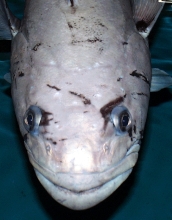Multimedia Gallery
"Seal Cam" project (Image 7)
An Antarctic toothfish (Dissostichus mawsoni). This image was taken as part of the National Science Foundation (NSF)-supported "seal cam" project, where scientists use seals as "eyes" to observe what goes on underneath the Antarctic ice. The Antarctic Weddell seals are a predator of the toothfish.
Researchers Lee Fuiman of The University of Texas at Austin, Randall Davis of Texas A&M University, Galveston, and Terrie Williams of the University of California, Santa Cruz, equipped 15 Antarctic Weddell seals with video cameras, infrared LEDs and data recorders. As a result, they've gained new insight into the habits of two very important Southern Ocean fish species: the Antarctic silverfish (Pleurogramma antarcticum) and the Antarctic toothfish (Pagothenia borchgrevinki). The seals--marine predators--serve as guided, high-speed, midwater sampling devices for fish that have been especially difficult to study. New information about the behavior and distribution of these species indicates that some existing theories may need to be revised. Although seal cam has its limitations, it is a promising technique and could be used to study other pelagic and deep-water fish and invertebrates that are otherwise impossible to observe in their natural environment.
This work was supported by grants from NSF's Office of Polar Programs (OPP 96-14857, OPP 97-08151 and OPP 96-18384) and by the West Coast office of the National Undersea Research Program (UAF 02-0080). (Year of image: 2001) [Image 7 of 7 related images. Back to See Image 1.]
Credit: Randall Davis, Texas A&M University; images under authorization of Marine Mammal Permit No. 821-1588-01.
Special Restrictions: Permission has been granted to use this image for personal and educational purposes only. Any other use of this image is prohibited without the express permission of Dr. Randall Davis, Texas A&M University. Contact Davis via e-mail at davisr@tamug.tamu.edu.
Images and other media in the National Science Foundation Multimedia Gallery are available for use in print and electronic material by NSF employees, members of the media, university staff, teachers and the general public. All media in the gallery are intended for personal, educational and nonprofit/non-commercial use only.
Images credited to the National Science Foundation, a federal agency, are in the public domain. The images were created by employees of the United States Government as part of their official duties or prepared by contractors as "works for hire" for NSF. You may freely use NSF-credited images and, at your discretion, credit NSF with a "Courtesy: National Science Foundation" notation.
Additional information about general usage can be found in Conditions.
Also Available:
Download the high-resolution TIFF version of the image. (1.4 MB)
Use your mouse to right-click (Mac users may need to Ctrl-click) the link above and choose the option that will save the file or target to your computer.

